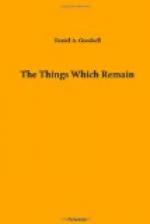* * * * *
Surely the doctrine, “I believe in the Holy Ghost,” will remain. It is a misfortune that the word “ghost” has, in our English use, an unworthy and terrifying significance. On this account it were well if we could substitute for constant use the word “Spirit.”
[Sidenote: The Holy Ghost.]
[Sidenote: The Energy of God.]
[Sidenote: The Interpreter.]
The Holy Spirit is the energy of God, whether working as Creator or in the processes of redemption. It stirs us to the depths when we consider that the Author of the worlds, the Source of the energies is He who transforms, renews, sanctifies, and witnesses in us. There is no question as to the pervasiveness and competence of the Power which “works in us to will and to do of His good pleasure.” We are taught to trace all our religious uplift to the highest possible source. We gather a great sense of our worth by the dignity of this association as we do of the condescension of our Lord in making His home in our hearts. This Holy Spirit is in all Christians the energy of the entire spiritual life. By this we do the things which by nature we can not do. His is that Divine impulse which initiates, continues, matures, and satisfies the life of God in us. It is the indwelling, all-pervading Holy Spirit, which interprets that great word, “I in them and Thou in Me, that they may be one as We are.”
[Sidenote: The Doctrine of Energy.]
And if the most advanced philosophy should yet be confirmed as true that there is nothing really but energy, none the less would the doctrine of the Holy Spirit abide. Back of all the individual energies of humanity; back of all the forces of nature is the supreme energy of God. If creation be our theory, it is the Spirit of God which broods on the face of the waters. If evolution be our creed, it is “in Him we live and move and have our being.” All science is but the knowing of His way of working, and all theology is but the discovery of His mind. To know Him is to know all things. The latest Christian will be saying, “I believe in the Holy Ghost.”
* * * * *
[Sidenote: The Forgiveness of Sin.]
[Sidenote: Huxley on Depravity.]
[Sidenote: Not All Born Good.]
[Sidenote: Experience of Hell.]
And what becomes of the doctrine of the “forgiveness of sins” in this outlook for “the things which remain?” Accepting Huxley as the incarnation of the skeptical spirit of our time, I quote from him his thought of sin, depravity, and punishment, as a hint of where the scientific spirit may yet aid us. “The doctrine of predestination, of original sin, of the innate depravity of man, the evil fate of the greater part of the race, of the primacy of Satan in this world, of the essential vileness of matter, of a malevolent Demiurgos subordinate to a benevolent Almighty who has only lately revealed




